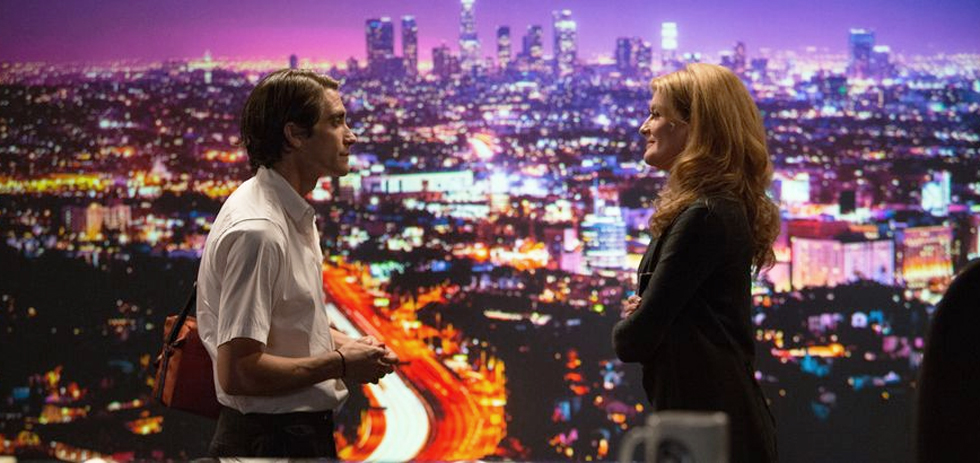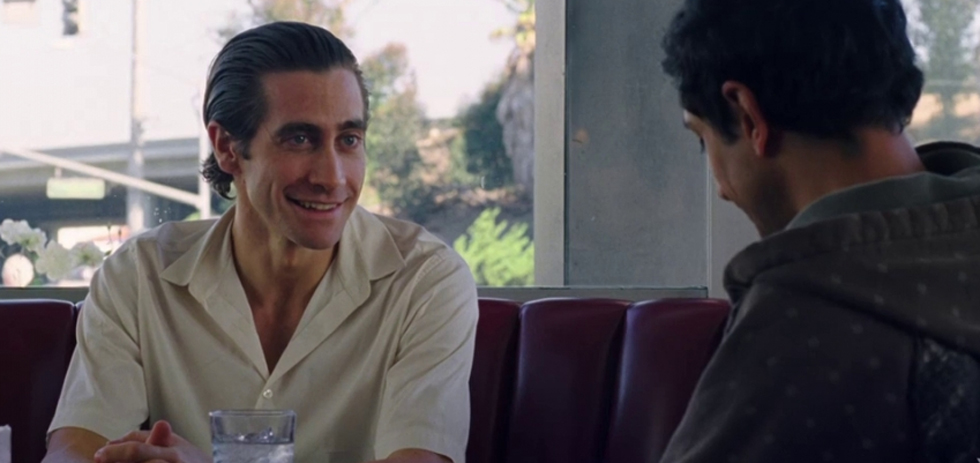
Nightcrawler exists within the realm of self-reflexive media commentary, following a protagonist who climbs up the ladder of TV news, yet Dan Gilroy’s feature debut works not on the basis of any incisive skewering of media broadcasting or consumption, but rather as a piece of grimy pulp fiction; it’s a tale of a person harnessing their misanthropy for monetary gain. There’s some shallow level attacks on local news and the importance of broadcasts and bloodlust running hand-in-hand, yet the heart of Nightcrawler isn’t in the bay of studio screens or the camera crew vans, it’s in the bugged-out eyes of someone relishing the opportunity to jettison societal constraints and get paid to do so.
Early on in the film, Louis Bloom (Jake Gyllenhaal) – unemployed, stripping metal from a fence and filled to the brim with motivational business rhetoric – asks the man he fleeces scraps to for a job. The man doesn’t even consider it, tersely saying, “I’m not gonna hire a fuckin’ thief.” Bloom nods, but with a smile on his face, an uncomfortable incongruity of emotion. Driving across one of L.A.’s freeways he stops just shy of a crash, policemen on the scene trying to pull a woman from the wreckage. The horror is undercut by cameramen rushing in to get the best angle of the bleeding victim. We cut back to Louis’ face, he’s almost in awe. That line of work is even easier than cutting chain wire fences – it’s still theft, but of dignity and privacy. The blood splatter comes with the territory.
Despite what seems to have been widely written about the feature, it has no grand designs at being a modern Network. Its focus is character, not consumption, and whilst some incidental overlaps do appear – romance as business transaction, violence amounting to higher ratings – Gilroy seems much more interested in an interplay between past and present than the whims of studio executives.1 One of the big thematic focuses in the narrative is the modern job market and the sense of fear and desperation in actually making money. Riz Ahmed’s Rick, roped in as Louis’ assistant on their nightly hunts for crime scenes, accepts a measly wage because that’s all that’s being offered to him.2 Louis himself spends a large portion of his dialogue spouting entrepreneurial wisdom gleaned from the internet, at times amusingly riffing on the virtues of unpaid internships as the film makes the case that such positions are akin to corporate slavery.
In looking at access and the internet, Gilroy plays off of the rise of technology by using Louis as representative of the fact that information is always available, but what the reader does with that access is paramount. The film doesn’t merely suggest that anyone can pick up a camera and become a successful nightcrawler, nor does it allege that if you spend an evening on Wikipedia you too can rote learn the inner workings of a television studio. Louis is able to do both because he obsessively builds upon that information and treats the knowledge as power. Gilroy plays with the perspective of screens – running the gamut from a handheld camera to a television screen – fully aware of how integral they are in the process of experiencing things in the modern day. It’s not the Network broad-ranging consumption by audience but rather of individuals. The scene that best illustrates this involves Bloom walking through a shot-up mansion before police arrive, experiencing the horror of death via his camera lens instead of his own eyes. When they watch the playback in the studio, the footage appears almost entirely point-of-view, allowing the producers to share his singular experience.
An updated version of Thom Anderson’s Los Angeles Plays Itself might have included some of the sequences in Nightcrawler, as Wesley Morris and Alex Pappademas have said, it’s not a side of L.A. often seen. We wait outside of restaurants, near pawn shops, at one point pulled over to the side of the road as Lou uploads some video footage to his laptop. The street could be any in the city –poorly lit, shuttered shopfronts to one side, expansive darkness beyond an overpass.3 In an interview with Elvis Mitchell, Gilroy cited The Terminator as an influence on Nightcrawler, meaning it in terms of the mental process of a character focused on one goal and being endlessly driven, yet there’s also a clear infusion of a nostalgic aesthetic. There Will Be Blood cinematographer Robert Elswit floods the frame with saturation, from the light pollution and sunset rendering the sky an ethereal purple to the oppressive yellowing of daylight on a street. The shots indoors are less impressive but still effective. A lot of the shots inside buildings play with lighting and juxtaposition, shots of dark and gloomy studio hallways move into a artificially bright studio set itself – when Bloom and news producer Nina (Rene Russo) stand behind the news desk, with the city skyline plastered onto the wall behind them, the saturation makes the scene feel uncomfortably unreal, a kindred spirit to Inland Empire‘s Hollywood talk show.

The original score, by James Newtown Howard, at times feels almost like it’s trying to ape those of Reznor/Ross, its merger of a faux-uplifting guitar line and shimmering distorted vocals feels very much a pale imitation of the unsettling musical juxtapositions in Gone Girl. There is one notable exception, though, a booming montage in the centre of the film that sees the overcooked anthem perfectly match Lou’s own absorption of his videos.
For a role which ostensibly reacts against character development, Gyllenhaal manages to make Bloom a gripping on-screen persona, delivering a thoroughly unsettling performance relying on almost reflexive masks of expression. Even in the sole moment of violent rage, an impressive scene in which Bloom smashes his bathroom mirror, Gyllenhaal’s gaze is frightening yet intentionally forced, the creation of a mask for purposes of self-deception. Bloom might be furious but he’s taking his cues from the movies, not his own real emotions. His dramatic weight loss is impressive, though it tends to detract from conversations about his line delivery, almost boyish at times, making his character all the more disturbing. Unlike in Villeneuve’s recent Enemy, which sees Gyllenhaal play dual roles that invoke hyper-masculinity, self-deception and paranoia, here he’s not playing off any sense of realism – Louis Bloom is a wonderfully concocted and exaggerated abnormality, switching from the almost blank expressions as he waters his plants to the faux-personability as he engages in small talk with the news anchor.
Gyllenhaal doesn’t carry the movie alone – all of the supporting performances are worth mentioning. Rene Russo is a character who finds greater complexity as the film goes on, more than holding her own in the uncomfortable scenes of eroticism in conversation with the clinical Gyllenhaal. Riz Ahmed’s assistant character is essential to the film, providing a way into the film for audiences. Though his own morality is slowly chipped away at over the course of the film, he still manages to provide, more often than not, the common sense response to Bloom’s lunacy. Bill Paxton, given his second scenery-chewing role this year after Edge of Tomorrow, is far better here than in Liman’s picture, relishing his role as the veteran nightcrawler.
Nightcrawler feels like a long film, despite its sub-two-hour runtime, and that’s a deceptive virtue. Despite having what seems like multiple opportunities to end the film in its last half-hour, Gilroy forgoes concluding on a climax, dragging us through consequence (or lack thereof), relying on an audience’s own sense of voyeurism or morbid curiosity to keep them invested. Its final scene is a little too neat and pat, but still, the film’s ability to immerse you in a character’s narrative, without ever really compelling you to their perspective, is an impressive feat. As an outwardly shallow and grimy character study that’s consistently engaging, funny and dark, Nightcrawler is one of the better films you’re likely to see as the year nears its end.
Around the Staff
| Felix Hubble | |
| Brad Mariano | |
| Jessica Ellicott | |
| Ian Barr | |
| Virat Nehru | |
| Ivan Čerečina | |
| Jamie Rusiti | |
| Dominic Ellis |
